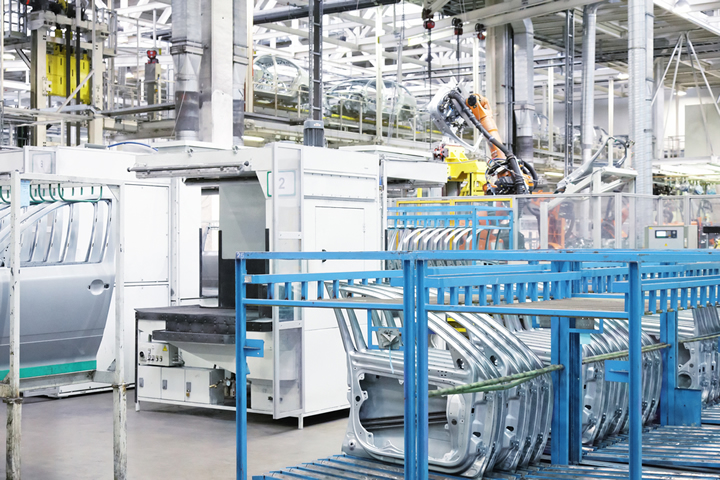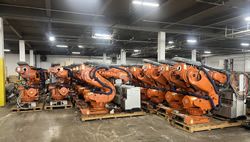Supply Chain - Articles, Stories & Interviews
Smart Automation: How AGVs and AMRs Help Manufacturers Manage Rising Costs
The time is now to invest in scalable, cost-efficient automation deployments, keeping in mind the importance of power and data delivery solutions that support consistent, productive operations.
The Rise of the Invisible Workforce: The Most Important AI Breakthroughs of 2025 for Packaging Manufacturers
For the packaging industry specifically — with its heavy reliance on document processing, planning logic, and throughput efficiency — the year proved one thing: AI is no longer a future advantage. It's a current competitive requirement.
Must-Have AI Features in your next ERP: Why AI-Enabled ERP Is a CEO's Best Investment
The next wave of competitive differentiation lies in embedding artificial intelligence (AI) directly within ERP/MIS systems - not as an add-on, but as a native capability driving data, decision-making, and automation across operations.
Organic Soda Producer Implements Traceability System in Just a Few Weeks
Fresh Fizz Sodas from Long Island needed a system that would help them comply with traceability regulations, and found the perfect solution in MRPeasy.
The Next Industrial Epoch is Here: Why Acting Now is a Strategic Imperative for Manufacturers
The convergence of technological maturity, proven financial returns, and a strategic need for resilient domestic production has created a generational opportunity, and the window to act is now.
10 Common Supply Chain Issues & How to Solve Them
Let's take a look at some of the major global supply chain issues of the past four years, then drill into the most common effects on businesses. You'll be surprised at the number of strategies you can implement to mitigate the risks.
Maximizing ROI with Mobile Automation: What the Data Shows
Technologies like autonomous mobile robots (AMRs) and automated guided vehicles (AGVs) are helping companies bring autonomy to material movement more efficiently, safely, and cost-effectively than ever before.
Supply Chain - Featured Stories
Beyond the Device: The Real Drivers of Industrial Mobility

Accessories don't just complement rugged devices, they complete them. They turn durability into productivity, resilience into results, and hardware into workflow platforms.
BTM INDUSTRIAL IS HOSTING AN ONLINE SALE OF INDUSTRIAL ROBOTS ON DECEMBER 17-18, 2025

Includes more than 200 robots designed to automate tasks, such as welding, manufacturing, packaging, warehousing, and food processing. This court-authorized sale requires the liquidation of all assets, regardless of price.
Manufacturing Asset Monetization: What It Is and How It's Done

This article will explain what manufacturing asset monetization is, outline the main methods companies use, and walk through the process step by step.
Supply Chain - News Headlines
Datalogic Launches Smart Vision Suite for Retail: The Industry's First All-in-One Embedded AI Software Solution for Real-Time Loss Prevention at Checkout
Datalogic, a global leader in automatic data capture and industrial automation, proudly announces the launch of Smart Vision Suite for Retail, a new AI-driven portfolio of software solutions designed to enhance loss prevention and checkout efficiency in retail environments, directly embedded in the updated Magellan™ 9600i and 9900i scanner platforms.
Antaira Introduces Ultra-Thin, 5-port Flat Mount PoE+ Switch for Space-saving Industrial Networking
Antaira has announced its new ultra-flat Ethernet switch, the FNP-0500G-T. Designed for modern control cabinets and space-constrained environments, it offers robust, high-speed connectivity with an installation depth of only 1.24 inches
Trelleborg Exhibits Innovations and Solutions for Medical Components and Devices at MD&M West
Integrated Solutions simplifies development and manufacturing systems, enhancing supply chains and logistics processes, driving cost savings?through bundled purchasing processes and consolidated audits, shipping and logistics.
Supply Chain - Featured Product
NORD Delivers Powerful, Reliable Drive Solutions for Demanding Packaging Applications


NORD Delivers Powerful, Reliable Drive Solutions for Demanding Packaging Applications
When you need quality, flexibility and high efficiency, NORD has you covered with complete drive solutions for primary and secondary packaging, end-of-line packaging, and higher-level applications. NORD supports you through the entire life cycle of your drive systems with pre-sales engineering support, online tools, and a global service network. Drive systems for both vertically and horizontally networked technology with all the options for sensor incorporation and integration into the higher-level control system.
Supply Chain - Featured Company

ResinDek / Cornerstone Specialty Wood Products
At Cornerstone Specialty Wood Products®, we know and understand the importance of having the right flooring product for the right application. That's why we offer a variety of ResinDek panels in different thicknesses, densities, and with different surface finishes. Since 1994, ResinDek flooring panels have been installed in distribution centers, warehouses, manufacturing plants, and cold storage facilities for major corporations worldwide. The intent of Cornerstone Specialty Wood Products then and now is "We don't just make better mezzanine floors"¦We make mezzanine floors better". We strive to provide solutions that improve the ergonomics in work environments, reduce environmental impacts, and bring significant value to the professionals in many different industries.









